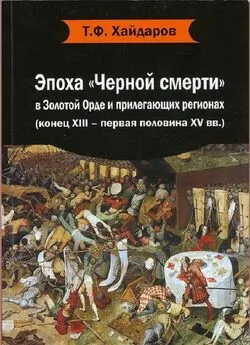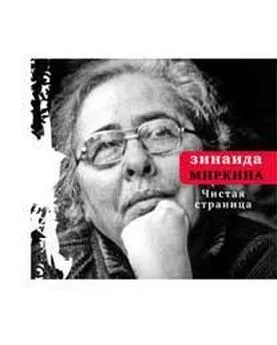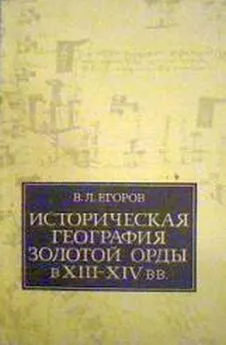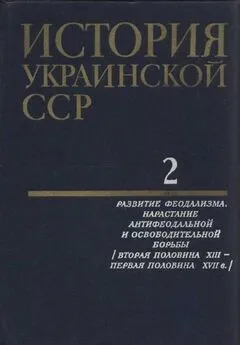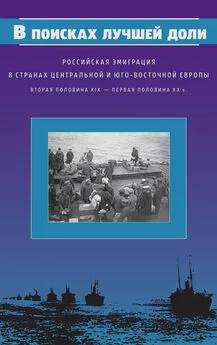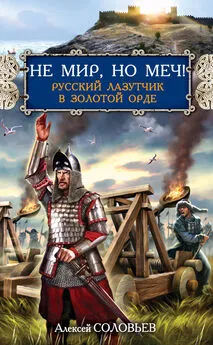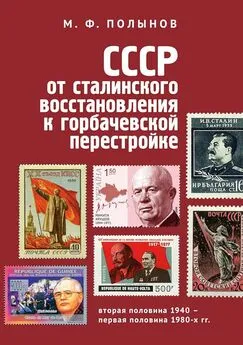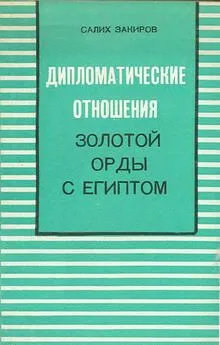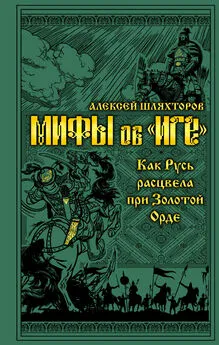Тимур Хайдаров - Эпоха «Черной смерти» в Золотой Орде и прилегающих регионах (конец XIII – первая половина XV вв.)
- Название:Эпоха «Черной смерти» в Золотой Орде и прилегающих регионах (конец XIII – первая половина XV вв.)
- Автор:
- Жанр:
- Издательство:Институт истории им. Ш. Марджани Академии наук Республики Татарстан
- Год:2018
- Город:Казань
- ISBN:978-5-94981-282-2
- Рейтинг:
- Избранное:Добавить в избранное
-
Отзывы:
-
Ваша оценка:
Тимур Хайдаров - Эпоха «Черной смерти» в Золотой Орде и прилегающих регионах (конец XIII – первая половина XV вв.) краткое содержание
На обложке: картина Питера Брейгеля «Триумф смерти», 1562 (Музей Прадо, Мадрид, Испания).
Эпоха «Черной смерти» в Золотой Орде и прилегающих регионах (конец XIII – первая половина XV вв.) - читать онлайн бесплатно полную версию (весь текст целиком)
Интервал:
Закладка:
38. Cummins N., Kelly M., О Grada C. Living Standards and Plague in London, 1560–1665 // Economic History Review. — 2016. — Vol. 69. — № 1. — P. 3–34.
39. Curtis D.R. Was Plague an Exclusively Urban Phenomenon? Plague Mortality in the Seventeenth-Century Low Countries. // Journal of Interdisciplinary History. — 2016. — Vol. 47. — №. 2. — P. 1–32.
40. De Guignes J. Histoire générale des Huns, des Mongoles, des Turcs et des autres Tartares occidentaux. — Paris, 1756–1758. — Vol. 1–4.
41. Daenell E.R. Blüttenzeit der deutsche Hanse. — Berlin, 1906. — Bd. 2.
42. Diddier R., Mouffok N., Bitam I., et al. Plague: History and Contemporary Analysis // Journal of Infection. — 2013. — Vol. 66. — №. 1 — P. 18–26.
43. Dols M.W. The Black Death in the Middle East. — New Jersey: Princeton University press, 1977. — 390 p.
44. Dois M.W. The second plague pandemic and its recurrences in the Middle East: 1347–1894 // EconSocHistOrient. — 1979. — № 22. — P. 162–189.
45. Fedorov V.N. Plague in Camels and its Prevention in the USSR // Bulletin of the Wealth Health Organization. — 1960. — Vol. 23. — № 2–3. — P. 275–282.
46. Finley Th., Koyama M. Plague, Politics, and Pogroms: The Black Death, Rule of Law, and the Persecution of Jews in the Holy Roman Empire // GMU Working Paper in Economics. — Fairfax, VA, 2016. — № 16–19.
47. Frederichs H. Die Gründung der Stadt Danzig // Hansische Geschichtsblätter (далее — HGBll). — 1937. — Jg. 61.
48. Fusco Id . La peste del 1656–58 nel Regno di Napoli: diffusione e mortalita // Popolazione e Storia. — 2009. — Vol. 2. — P. 115–138.
49. Gage K.L., Kosoy M.Y. Natural history of plague: perspectives from more than a century of research // Annu. Rev. Entomol. — 2005. — Vol. 50. -P. 505–528.
50. Green M.H . (ed.) Pandemic Disease in the Medieval world. Rethinking the Black Death. — Kalamazoo and Bradford: Arc Medieval Press, 2015a.
51. Green M.H. The Black Death and Ebola: On the Value of Comparison / Disease in the Medieval world. Rethinking the Black Death, edited by Monica H. Green. IX–XX. — Kalamazoo and Bradford: Arc Medieval Press, 2015b.
52. Green M.H. Taking 'Pandemic' Seriously: Making the Black Death Global / Pandemic Disease in the Medieval world. Rethinking the Black Death, edited by Monica H. Green. — Kalamazoo and Bradford: Arc Medieval Press, 2015c. — P. 27–61.
53. Haeser H. Geschichte der epidemische Krankheiten / Lehrbuch der Geschichte der Medicin und der epidemischen Krankheiten. — Jena, 1865. — Bd. 13. Русский перевод данной книги: Гезер Г . История повальных болезней. — СПб., 1867. — Т. 1–2. — 735 с.
54. Hahnemann S. Die chronischen Krankheiten. — Dresden, Leipzig, 1835. — Bd. 1.
55. Hecker J.F.C. Der schwarze Tod im vierzehnten Jahrhundert: Nach den Quellen für Ärzte und gebildete Nichtärzte bearbeitet. — Berlin, 1832.
56. Herlihy D . Medieval and Renaissance Pistoia. — New Haven-London: Yale Universitity Press, 1967.
57. Herlihy D . Santa Maria Impruneta: A Rural Commune in the Late Middle Ages / Florentine Studies. Politics and Society in Renaissance Florence, edited by Nicolai Rubinstein. — Evanston: Northwestern University Press, 1968. — P. 242–276
58. Herlihy D. The Distribution of Wealth in a Renaissance Community: Florence 1427 / Towns in Societies: Essays in Economic History and Historical Sociology, edited by Philip Abrams and Edward Anthony Wrigley. — Cambridge: Cambridge University Press, 1978. — P. 131–157.
59. Herlihy D. The Black Death and the Transformation of the West.-Cambridge, MA Harvard: University Press, 1997.
60. Herlihy D., Cohn S.K.Jr. The Black Death and the Transformation of the West. — Cambridge: MA, 1997. — 117 p.
61. Hirsch A . Handbook of geographical and historical pathology. — London, 1883. — Vol. 1–3.
62. Höhlbaum K . Die Gründung der deutschen Kolonie an der Düna // HGBll. — 1872. — Jg. 2.
63. Irmeli P. The Prophet's Medicine: A Creation of the Muslim Traditionalist Scholars. — Helsinki, 1995.
64. Kahan A. Natural Calamities and Their Effect upon Food Supply in Russia (An Introduction to a Catalogue) // Jahrbücher für Geschichte Osteuropas. — 1968. — P. 353–377.
65. Khaidarov T.F., Dolbin D.A., Kravtsova O.A., Tuchbatova R.I. Biological Aspects of the Historical Urban Development of Jochi Ulus (Latter Half of the 13–14th Centuries) // The Social Sciences. — 2015. — Vol. 2015. — P. 1047–1053.
66. Keyser E. Olivaer Studien II // Zeitschrift des Westpreussischen Geschichtsvereins (далее ZWG). — 1928. — Hf. 68. — Teil 2. — S. 1–36.
67. Koebner R. Urkundenstien zur Geschichte Danzigs und Olivas von 1178–1342 // ZWG. — 1934. — Ver. 71
68. Langer L.N. The Black Death in Russia: Its Effects Upon Urban Labor // Russian History. — 1975. — Vol. 2. — P. 53–67.
69. Langer L.N. Plague and the Russian Countryside: Monastic Estates in the Late Fourteenth and Fifteenth Centuries // Canadian-American Slavic Studies. — 1976. — Vol. 10. — P. 351–368.
70. Li Y. et al. Different region analysis for genotyping Yersinia pestis isolates from China // PLoS ONE. — 2008. — № 3(5). — P. 1–10.
71. Lopez R.S., Miskimin H.A., Udovitch A. England to Egypt, 13501500: Long-Term Trends and Long-Distance Trade // Studies in the Economic History of the Middle East. — 1970. — P. 93–128.
72. Martin C. Versuch einer geogr. Darstellung einiger Pestpidemien / Petermann's Mitteilungen. — 1879. — Bd. XXV. — № 7.
73. Mayer K. The ecology of plague // Medicine. — 1942. — Vol. 21 (2) — P. 143–174.
74. McNeill W.H . Europe's Steppe Frontier, 1500–1800. — Chicago, 1964. — 264 p.
75. McNeill W.H . Plagues and Peoples. — New York, 1976. — 368 p.
6. More F.A. et al ., Next-generation ice core technology reveals true minimum natural levels of lead (Pb) in the atmosphere: Insights from the Black Death // GeoHealth. — 2017. — P. 1–9.
77. Nogal Àl.C., De la Escosura L.P. The Rise and Fall of Spain (1270–1850) // Economic History Review. — 2013. — Vol. 66. — № 1. — P. 1–37.
78. Norris J. East or west? The geographic origin of the Black Death // Bull. Hist. Med. — 1977. — Vol. 51. — P. 1–24.
79. Pamuk S. The Black Death and the Origins of the "Great Divergence" across Europe, 1300–1600 // European Review of Economic History. — 2007. — Vol. 11. — P. 289–317.
80. Pamuk S., Shatzmiller M. Plague, Wages, and Economics Change in Islamic Middle Easte, 700–1500 // The Journal of Economic History. — 2014. — Vol. 74. — No. 1. — P. 196–229.
81. Papan-Matin F . Beyond: The Mystical Teaching of 'Ayn al-Qudat al-Hamadhanr. — Leden, Boston: Brill, 2010. — 245 p.
82. Pollitzer R. Plague studies // Bulletin of the Wealth Health Organization. — 1951. — № 4. — P. 475–533.
83. Pollitzer R. Plague. — Geneva, 1954.
84. Rasmussen S., Allentoft M.E. et al. Early Divergent Strains of Yersinia pestis in Eurasia 5,000 Years ago // Cell. — 2015. — № 163. — P. 571–582.
85. Rommes R. Plague in Northwestern Europe: The Dutch Experience, 1350–1670. // Popolazione e Storia. — 2015. — Vol. 16. — №. 2. — P. 47–71.
86. Skott S., Duncan Ch.J. Biology of Plague: Evidence from Historical Populations. — Cambrige, 2001. — 420 p.
87. Schamiloglu U. The End of Volga Bulgarian // Varia Eurasiatica. Festschrift für Professor Andras Rona Tas. — Szeged, 1991.
88. Schamiloglu U. Preliminary Remarks on the Role of Disease in the History of the Golden Horde // Central Asian Survey. — 1993. — № 12(4). — P. 447–457.
89. Schamiloglu U. The Rise of the Ottoman Empire: The Black Death in Medieval Anatolia and Its Impact on Turkish Civilization // Views from the Edge: Essays in Honor of Richard W. Bulliet, ed. Neguin Yavari, Lawrence G. Potter, and Jean-Marc Ran Oppenheim. — New York: Columbia University Press, 2004. — P. 255–279.
90. Schaube K. Noch eimal zur Bedeutung von hansa // Historische Viertelljahrsschrift. — 1908. — Jg. 15.
91. Schmid B.V., Buentgen U., et al. Climate-driven introduction of the Black Death and successive plague reintroductions into Europe // PNSA. — 2015. — Vol. 112. — № 10. — P. 3020–3025.
92. Schnurrer Fr. Chronik der Seuchen: in Verbindugen mit den gleichzeitigen Vorgängen in der physischen Welt und in der Gesschichte der Menschen. — Tübingen, 1825.
93. Simson P. Geschichte der Stadt Danzig. — Danzig, 1913. — Bd. I.
94. Spyrou A.M., Tukhbatova R.I. et al. Historical Y. pestis Genomes Reveal the European Black Death as the Source of Ancient and Modern Plague Pandemics // Cell Host & Microbe. — 2016. — Vol. 19. — P. 874–881.
95. Stein W. Zur Enstehung und Bedeutung der Deutschen Hanse // HGBll. — 1911. — Bd. 17.
96. Stewart J. The Nestorian missionary enterprise. — Edinburgh, 1928. — 248 p.
97. Sticker G. Die Geschichte der Pest // Die Abhandlung aus der Seuchengeschichte und Seuchelehre. — Gießen, 1908. — Bd. 1.
98. Twigg Gr. The Black Death: a biological reappraisal. — London, Batsford, 1984. — 254 p.
99. Varlik N. Plague and Empire in Early Modern Medirreanean World. The Ottoman Experince, 1347–1600. — New-York, 2015a. — 336 p.
100. Varlik N. New Science and Old Sources: Why the Ottoman Empire Matters / Pandemic Disease in the Medieval World. Rethinking the Black Death, edited by Monica H. Green. — Kalamazoo and Bradford: Arc Medieval Press, 2015b. — P. 193–227.
101. Vernadsky G. The Mongols and Russia. — New Haven: Yale University Press, 1953. — 462 p.
102. Voitgländer N., Voth H.-J. Persecution Perpetutated: The Medieval Origins of Anti-Semitic Violence in Nazi Germany. // Quarterly Journal of Economics. — 2012. — Vol. 127. — № 3. — P. 1339–1392.
103. Wallerstein I. The Modern World System I: Capitalist Agriculture and the Origins of the European World-Economy in the Sixteenth Century. -New York, 1974.
104. Wheelis M. Biological Warfare at the 1346 Siege of Caffa // Historical review. — 2002. — Vol. 8. — № 9. — P. 971–975.
105. Lien-teh Wu, Chun J.W. H., Pollitzer R., Wu C.Y. Plague: a manual for medical and public health workers. — Shanghai, 1936.
106. Ziegler Ph. The Black Death. — London, 1969. — 339 p.
107. Zhgenti E., Johnson S.L., Davenport K.W. et al. Genome Assemblies for 11 Yersinia pestis Strains Isolated in the Caucasus Region // Genome Announcements. 2015. Vol. 3, issue 5, e01030–15. doi:10.1128/genomeA.01030–15
Приложение






Timur F. Khaidarov
Интервал:
Закладка:
